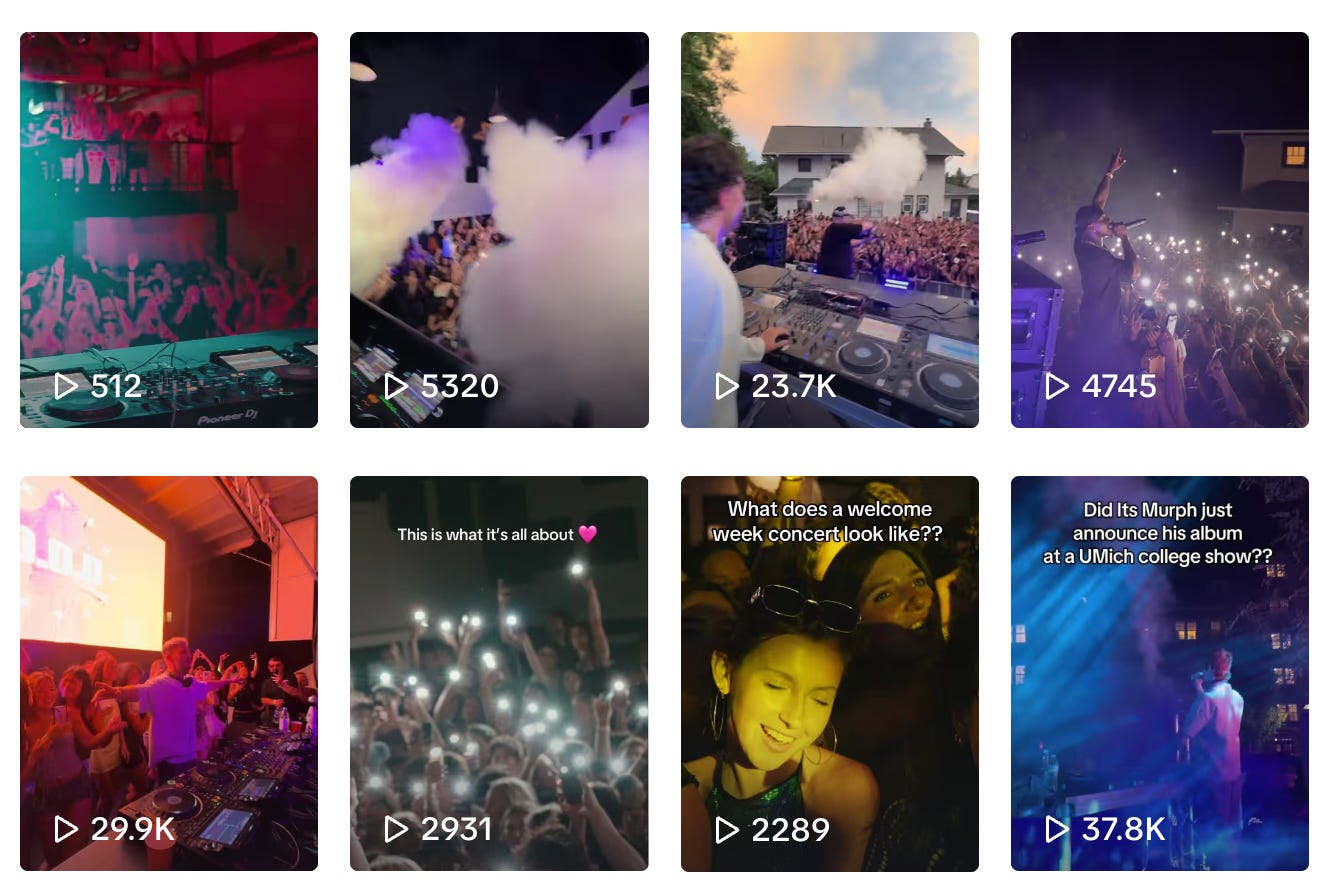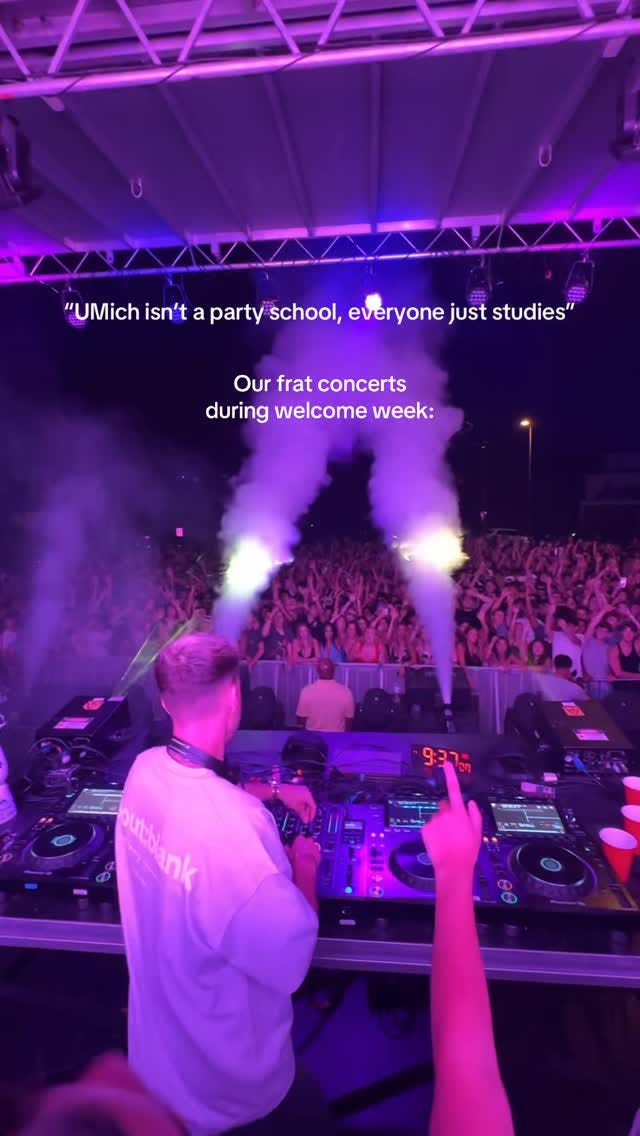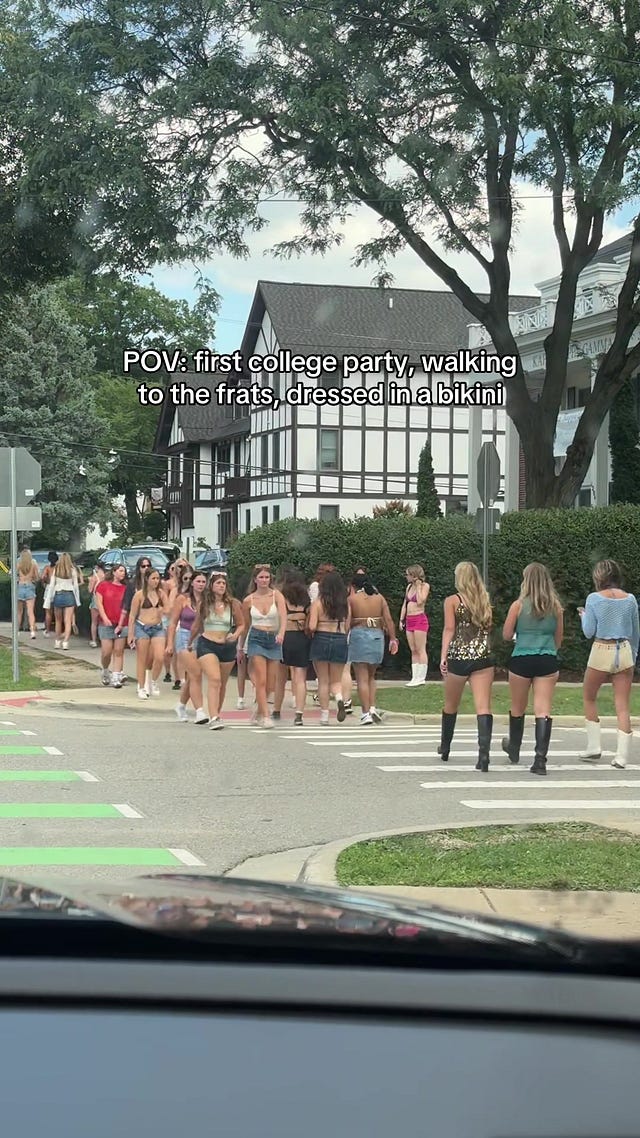Who says Gen Z is done partying?
It's Welcome Week on campuses across the country, and Gen Z 2.0 sure looks like they’re having plenty of fun.
The internet and media has collectively declared the end of party culture for Gen Z – also dubbed the loneliest generation. But I encourage anyone who thinks Gen Z hates partying to watch ‘Welcome Week’ TikTok (Bama Rush who?).
The videos posted over the past few weeks fly in the face of this narrative that Gen Z is more interested in scrolling social media alone than hanging out with their friends. In fact, it’s the opposite.
Gen Z 2.0 in particular grew up during the Covid-19 pandemic and the lockdowns that accompanied it. They are so sick and tired of an isolated existence that they are leaning into in-person experiences more than ever before.
Of course, there are a range of experiences and perspectives within this cohort. But I’m seeing a massive appetite for shared community events, being around others in person, and just having fun.
This doesn’t mean they are throwing social media to the wayside. Their hunger for IRL events dovetails with a need to post how much fun they are having too. We’re watching all of this unfold on social media, with creators and companies leaning into the marketplace of party content with tailor-made videos for Instagram and TikTok (for one, RushLink is changing the college party experiencing with full blown rave-like live concerts and a social media profile that documents their events).
This week, I’ve been obsessed with content from Josie Stoffan, a junior at University of Michigan, who dubs herself on Instagram as “🪩just a girl sharing her real college life.”
The FOMO effect of social media isn’t new. But for Gen Z 2.0, college now unfolds in a world shaped by NIL deals, the TikTokification of Greek life, campus influencers, and constant content creation: where life plays out on a split screen, both online and offline. This raises the stakes for what today’s students expect campus life to look and feel like.
To learn more about how these dynamics are manifesting on campuses across the country, I reached out to some of The Up and Up Community’s Gen Z ambassadors.
Here’s what they had to say:
“Welcome Week has felt really lively this year, lots of energy. The events have been packed, from the big concerts to smaller club fairs, and people seem eager to reconnect with friends. It feels like there’s a good mix of excitement from first-years experiencing everything for the first time and upperclassmen jumping back into the rhythm of campus life,” said a young man in Massachusetts.
“I would say there’s definitely no shortage of it especially during sylly week. We’ve been going out to frats this week and I haven’t really met anyone yet that was ‘done with partying,’” said a young man in North Carolina.
“At my university, there is a week before the upperclassmen arrive on campus that serves as a freshman’s first taste of true freedom. It’s unofficially called O-Week by students, and it’s known for being a particularly party-filled stretch of time. New-to-college students spend the week visiting the area’s most beloved dive bars and hangout spots, while trying to make friends by repeatedly asking and answering the same questions,” said a young woman in North Carolina.
“The week culminates on Saturday, when upperclassmen return to campus and attend an America-themed opening fraternity party. This party regularly draws more than 1,000 attendees, making up about 16% of the school’s undergrad population. For upperclassmen, there’s the excitement of reuniting with friends after three months apart, and for freshmen, there’s the exhilaration of new opportunities and relationships. For one short weekend, everyone is all in on the partying. For many freshmen, the partying and socializing remain exciting throughout their first semester and even their first year.”
But that doesn’t necessarily mean that party energy will last, this ambassador told me. She’s noticed that throughout the year, it tends to wane, in fact perhaps, because of social media, and poses a provocative question:
“As classes and club meetings pick up, many students eventually choose to stay in instead of going out. In part because of social media, members of Gen Z have been ‘taught’ to prioritize wellness and self-care. Many of my peers would rather have a cozy night in their pajamas watching the newest episode of The Summer I Turned Pretty – even if that means missing out on playing games with plastic cups in a fraternity basement. We’ve been taught to put ourselves, our emotions, and our health first. This isn’t necessarily a bad thing, but I do believe it influences how we socialize and form relationships. We’re far less afraid to say no to something or someone if we believe it will help us feel less tired the next day or avoid a raging headache. That said, it raises the question: Is Gen Z sacrificing memorable nights and funny stories in exchange for just a good eight hours of sleep?”
Another student in North Carolina pushed back on headlines heralding the end of party culture for Gen Z, and said she’s seen the enthusiasm for massive social gatherings change as students get older.
“I think that’s definitely a myth, people at my college still party a lot but I think the culture of it can sort of shift depending on age/school year and college culture,” she said.
“A lot of freshmen will want to go to frat parties because they tend to be bigger and more typical of the massive party experience that they envision from college, it’s more of a novelty thing. And then juniors and seniors will prefer smaller house parties more because frats can feel very draining and it’s nicer to just have it be more intimate groups of people you know.”
She added some nuance, and feels like in this way, Gen Z isn’t so different from any generation prior: “Perhaps that’s the shift those articles might be misinterpreting? Just as most of Gen Z is getting older now — but I don’t think that’s necessarily an ‘our generation’ specific trend, but just the typical trend of getting older and understanding what’s actually fun vs what’s just a stereotypical/novelty party experience.”
Gen Z 2.0 in particular seems to be obsessed with redefining all things millennial. So this fall, I’m keeping an eye on how party culture shows up on campus. With the help of our ambassadors, we’ll be tracking how students are socializing in real time.
Stay tuned…
Noteworthy reads
Everyone is talking about how Gen Z is “cheating” with ChatGPT. But the real story is that students are anxious and confused about how to actually use AI, and desperate to learn how to use it right. My latest op-ed for The Washington Post explores these dynamics. Read why ‘The AI cheating panic is missing the point,’ here.
Lower-income, Gen Z people are investing at record rates, data shows, Madison Mills for Axios
The US Open dating show: How Grand Slam tennis tournaments are shooting for a Gen Z audience, Alyce Brown for The Associated Press





